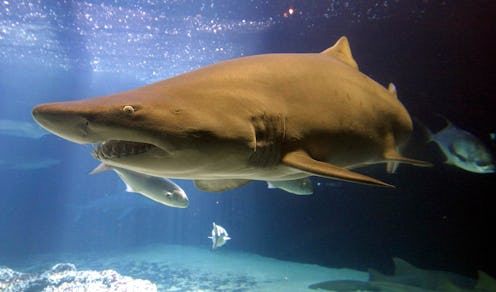News
Sharks Have 1000s of "Teeth" You Never Knew About
Turns out Jaws was just the tip of the iceberg. Shark skin is covered with tiny teeth — because the ones they have in their mouths weren't intimidating enough, apparently. Scientists used a 3D-printed model to study these tiny "denticles" — which help to make sharks the great swimmers that they are — in order to replicate the effect in a synthetic skin.
The denticles have never been this closely replicated before, but with 3D printing technology, scientists finally have something to work with. Researcher George Lauder of Harvard University and his team took a scan of a tiny sample of skin from the mako shark, then built a 3D model of a single denticle, measuring at just 0.15mm long. They then had to attach thousands of these tiny models to a smooth, flexible membrane to create a synthetic skin similar to the shark's. The whole thing took them about a year.
So how do these tiny little teeth help you go faster? Apparently, creating turbulence near the edge of a moving object actually helps push the water down and create less drag for the shark. Lauder also cited the change in water flow as another factor. "It can help suck the fish forward," he told BBC News. "The structure of the skin may actually increase the thrust — the engine of propulsion — rather than just reducing the drag."
When researchers completed the skin, the test results were clear: these tiny teeth-things do aid swimming. A paddle with the new denticle-covered skin was able to swim up to 6.6 percent faster than a paddle with regular, smooth skin, while also expending 5.9 percent less energy. Considering sharks spend the bulk of their day swimming, some even while they sleep, these little teeth scales are a major help.
When will synthetic skins like this start appearing on bikinis and Speedos? Don't hold your breath (pun absolutely intended). According to Professor Lauder, it could take decades to mass-produce these for the public — "but if you could do it, you would see a dramatic effect on swimming performance!"
So whether you're a die-hard fan of Shark Week on the Discovery Channel or you won't even go swimming at the Rockaways for fear of a shark attack, there's one thing both camps can agree on: the shark is a magnificent creature and it should be respected. If you're still not convinced, here are some interesting facts we bet you didn't know about the mighty shark.
- Shortly after birth, baby sharks swim away to fend for themselves — and they can do that because they're born with a full set of teeth.
- Different breeds have different eating styles. For example, larger species like the whale shark filter feed by swimming through the ocean with their mouths open while the great white will sneak up on its prey from below — just like in Jaws! The blue shark is especially gluttonous, as they'll eat until they puke and then eat again.
- Great white sharks avoid fighting each other over food. Instead, they have a tail-slapping contest and whoever delivers the most tail slaps against the surface of the water gets the prey.
- Recreational shark fishing wasn't popular until after Jaws because the movie spurred feelings of vengeance in humans.
- Sharks respond to "yummy hum," an infrasonic sound that fish make when they're injured, making them an easy dinner.
- It is extremely rare for sharks to get cancer — only about a dozen cases have been recorded.
- The orca (killer whale) might be the only predator that the great white needs to worry about. Orcas can easily overpower a great white.
- Shark fin soup is a delicacy in China, but the finning industry kills 73 million sharks each year, making certain breeds endangered. Gordon Ramsay made a documentary investigating the industry.
- The depletion of sharks has far-reaching effects on the ocean's ecosystems, as they are an integral part of the food chain.
- Contrary to popular belief, great white sharks rarely attack people, and when they do it's because they've mistaken you for their usual prey, and when that happens they usually realize their mistake and stop chomping. So don't be so presumptuous, humans.
- But just because they are not trying to attack you, don't do this:
